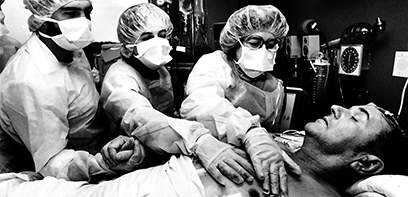Feature Article: Can the heart be mechanically replaced?
 William Schroeder lived for 620 days after his diseased heart was removed from his chest and replaced with an artificial heart. In the first moments after he emerged from the operating room, his wife and children were photographed with their hands on his chest – wanting to feel his new heart beating.
William Schroeder lived for 620 days after his diseased heart was removed from his chest and replaced with an artificial heart. In the first moments after he emerged from the operating room, his wife and children were photographed with their hands on his chest – wanting to feel his new heart beating.
The year was 1984, and Schroeder was one of the first patients with an artificial heart who lived long enough to tell the world what it felt like.
“With artificial hearts, there has always been this curiosity that the patient is somehow changed,” said Shelley McKellar, PhD, whose new book Artificial Hearts hit bookshelves in January. “Because of the cultural view of the heart as ‘the seat of the soul’ or site of one’s emotions, there was a worry that a mechanical heart might alter you in some way.”
McKellar, an associate professor in the Faculty of Social Science and the Hannah Chair in the History of Medicine at the Schulich School of Medicine & Dentistry at Western University, says we live in a society where people have a fascination with the idea of replaceable parts.
So, can you replace your human heart with a mechanical one? McKellar says technically, yes.
“This is an invention that had a lot of difficulties because it was, and still is, an imperfect technology,” McKellar said. “I argue that it's the desirability, more than the feasibility or the practicality of an artificial heart that drove this invention forward.”
It was at the Smithsonian Institution, where McKellar viewed the very first artificial heart ever implanted in a patient. That device, implanted in 1969, is one of the most popular objects at the Smithsonian, and it sparked her interest in the topic.
Today, cardiac surgeons have access to a variety of artificial heart devices to meet different levels of heart failure in their patients. In addition to a complete heart replacement device, the more popular approach is a ‘partial artificial heart’ or ventricular assist device – a mechanical pump that assists the patient’s diseased heart (which is not removed), supporting heart function and blood flow, as a bridge to transplantation or as a bridge to recovery after surgery.
“Artificial hearts are a clinical reality today,” said McKellar. “But that reality was in no way certain or inevitable. There were many points in the trajectory of its history that this technology might have been abandoned and that’s what makes it so interesting. This could have ended in a very different way.”








